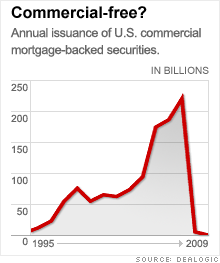Is a commercial real estate bust inevitable?
The government hopes to restore lending via cheap financing. Skeptics say programs aimed at restarting the market haven't worked yet.
 |
| Elizabeth Warren's oversight panel will discuss commercial lending issues Thursday. |
 |
| Bank lending has slowed, but securities issuance has fallen off a cliff. |
NEW YORK (Fortune) -- Bailout watchdogs have something new to growl about: the lack of financing in the commercial real estate markets.
Elizabeth Warren's Congressional Oversight Panel is scheduled to hold a hearing Thursday morning on the effectiveness of federal plans to restart the markets for commercial and industrial loans.
The five-member panel, which reports monthly on Treasury's Troubled Asset Relief Program, is scheduled to hear testimony from witnesses including Rep. Carolyn Maloney, D-N.Y., the chairman of Congress' Joint Economic Committee, and three banking executives.
The panel comes as financing for commercial real estate projects has slowed to a trickle with the sharp downturn in the economy. Meanwhile, a huge supply of commercial loans is coming due for refinancing, adding to potential stress on banks and other lenders.
The government has responded with programs such as the Federal Reserve's Term Asset-Backed Loan Facility, which aims to spur asset-backed lending. But there are few signs that these efforts are succeeding in restoring the health of markets that collapsed in 2007 after years of breakneck growth.
Developers say they are confident the administration and Congress understand that they need more help.
"There is a lot of recognition that commercial real estate is a core component of this economy," said Adam Ifshin, president of developer DLC Management in Tarrytown, N.Y. "There's a chance here to help this situation before it gets any worse."
Bank lending for commercial projects in the first half of 2009 is on track to hit about $25 billion, according to Matt Anderson at research firm Foresight Analytics in Oakland, Calif.
By way of comparison, commercial loan origination was at pace of $33 billion a quarter at the peak of the market.
Still, loan volume looks positively healthy next to the action in the commercial mortgage-backed securities (CMBS) market, the packaging of loans into bundles sold to investors.
There has been no U.S. issuance of CMBS this year -- just two years after bond issuers sold a record $221 billion's worth of those types of securities, according to data from research firm Dealogic.
Meanwhile, Anderson said that about $178 billion in commercial mortgages are due to mature in 2009. That would be the biggest-ever slug of refinancing demands ever to hit this market.
"We're going to have to get some liquidity in these markets before we see a wave of bankruptcies," said Bob Toothaker, who helps run a property management firm in Indiana and is chairman of the Realtors Commercial Alliance.
In response, the government has rolled out plans such as TALF and the Treasury's Public-Private Investment Program, which seeks to remove troubled assets from bank balance sheets.
Investors have had particularly high hopes for TALF, which provides financing to holders of asset-backed securities. The Fed rolled out TALF in November to bolster the markets for installment loans like student and auto borrowings.
The Fed has since extended the program to CMBS -- and tailored the terms to the industry's liking, by making previously issued securities eligible and extending the terms of TALF financing to five years from three.
But would-be users of both TALF and PPIP remain leery of interacting with the government, which has changed the terms of previous programs and generally acted capriciously in the eyes of some investors.
And while a five-year loan is better than a three-year one, some real estate investors would like to get 10-year financing. The Fed is reluctant to commit to such long-term loans with inflation fears growing.
With financing still absent, one strategy being pursued by many lenders is to extend maturing loans by a year for borrowers who are current in their payments. Ifshin calls this a sensible approach in many cases, and one that limits the damage to the economy from the locked-up credit markets.
But others warn that this tactic, dubbed "extend and pretend" by skeptics, will only add to the backlog of mortgages needing to be refinanced later - and put off the reckoning from hundreds of billions of dollars of loans written in the middle of this decade -- a time when underwriting standards were poor.
"What the lenders are saying is we all hope things will be better a year from now," said Joel Ross, a longtime real estate investor who runs the Citadel Realty investment bank in New York. "But prices are down 25%-40% from 2007, and those prices aren't coming back." ![]()
-
 The retail giant tops the Fortune 500 for the second year in a row. Who else made the list? More
The retail giant tops the Fortune 500 for the second year in a row. Who else made the list? More -
 This group of companies is all about social networking to connect with their customers. More
This group of companies is all about social networking to connect with their customers. More -
 The fight over the cholesterol medication is keeping a generic version from hitting the market. More
The fight over the cholesterol medication is keeping a generic version from hitting the market. More -
 Bin Laden may be dead, but the terrorist group he led doesn't need his money. More
Bin Laden may be dead, but the terrorist group he led doesn't need his money. More -
 U.S. real estate might be a mess, but in other parts of the world, home prices are jumping. More
U.S. real estate might be a mess, but in other parts of the world, home prices are jumping. More -
 Libya's output is a fraction of global production, but it's crucial to the nation's economy. More
Libya's output is a fraction of global production, but it's crucial to the nation's economy. More -
 Once rates start to rise, things could get ugly fast for our neighbors to the north. More
Once rates start to rise, things could get ugly fast for our neighbors to the north. More







